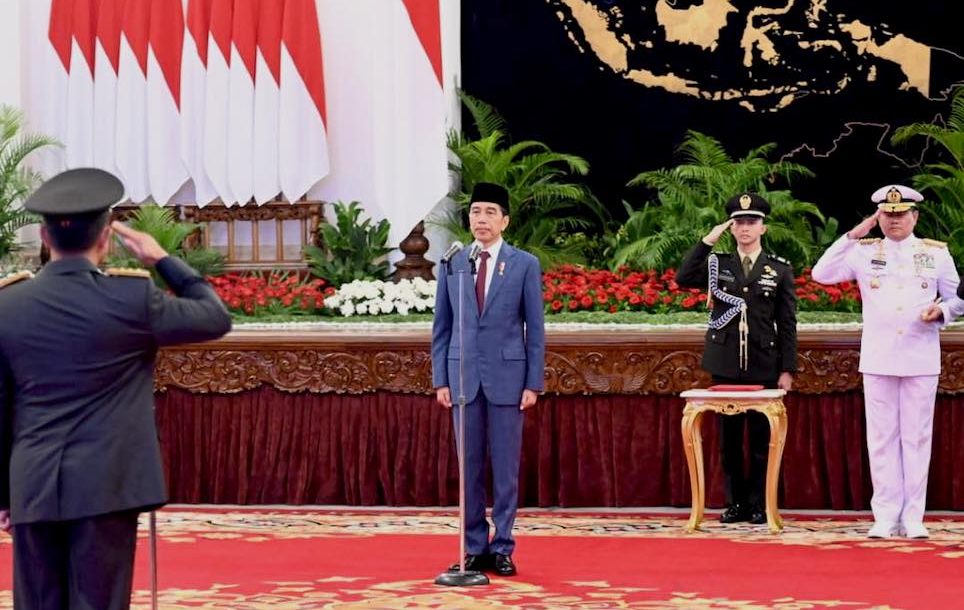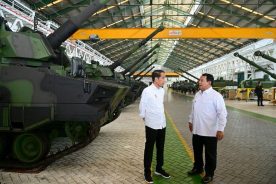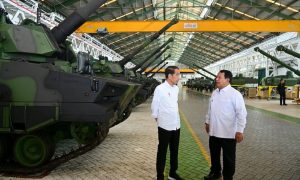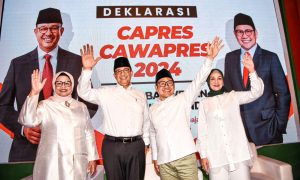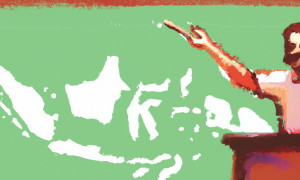On 22 November, President Joko “Jokowi” Widodo inaugurated General Agus Subiyanto as the new chief of the Indonesian Armed Forces (Tentara Nasional Indonesia, or TNI). Agus’ appointment raised eyebrows for a number of reasons.
One was the premature process of his nomination. General Subiyanto went from Army Chief of Staff (Kasad) to TNI Chief in just less than a month. Another was that his military career showcased an interesting track record, with the general having held a number of positions that intersected with President Jokowi’s political career. Agus was Commander of Surakarta Military District (Dandim 0735/Surakarta) in 2009–2011 when Jokowi was the mayor of the Central Java city (which is colloquially known as Solo). In 2020–2021, he served as a commander of Presidential Security Forces (Paspampres), which provide close personal protection to the president and other VIPs.
A similar situation happened before when Jokowi appointed Hadi Tjahjanto as TNI chief back in 2017. Hadi was a former commander of Adi Soemarno Air Base in Solo (2010–2011), also during Jokowi’s mayorship. The pattern also occurred in the appointment of Police Chief (Kapolri) Listyo Sigit Prabowo in 2021. Listyo served as Solo’s police chief (Kapolres) in 2011 and Jokowi’s presidential adjutant in 2014.
The elevation of Agus Subiyanto has completed Jokowi’s concerted effort to cement his political power amidst the upcoming national elections in 2024. As an incumbent in his last year of office, Jokowi has gone the extra mile to ensure that he is surrounded only by trusted confidantes who have supported him and will remain loyal to him.
How do we explain the pattern of top military leadership appointments during Jokowi’s presidency? In what ways has the placement of the “president’s men” as top military leaders consolidated Jokowi’s influence over the military?
From mandala politik to personalistic relationships
In the early part of his first term, Jokowi was practically a lame duck president. Though he and then vice president Jusuf Kalla got a majority of votes in the 2014 elections, and were supported by a massive number of volunteers, Jokowi soon realised that he must accommodate not only PDI-P, the political party that nominated him, but also other coalition parties.
A collision of interests between Jokowi and the parties first appeared when Jokowi nominated, then cancelled, the nomination of Budi Gunawan, then a police commissioner general, as national police chief. Budi had been reported to have a suspicious amount of money in his bank account, and the Corruption Eradication Commission (KPK) announced him as a suspect in a graft case. But his nomination to lead the police force was strongly supported by PDI-P. Jokowi’s relationship with PDI-P fell into crisis after Widodo cancelled Budi’s nomination after a public outcry.
Jokowi reacted to the unstable political situation by forging a political alliance with the military, and to some extent the police. He consolidated support by appointing military figures over whom he could best assert his influence, establishing himself as the centre of influence, or mandala politik. This strategy was reflected in the appointment of Gatot Nurmantyo as TNI chief in 2015 and Tito Karnavian as police chief in 2016. Jokowi appointed these figures because their alternatives were seen have relatively closer relations with PDI-P. Jokowi then strengthened his influence over the military by accommodating the expansion of its role in non-defence affairs—such as signing MoUs of cooperation with various civilian ministries and state-owned enterprises, and harnessing its ability to conduct so-called “military operations other than war” (operasi militer selain perang, or OMSP), particularly on counter-terrorism.
Another hit to Jokowi came in the form of the massive 2016 rallies organised by Islamist groups—which coalesced into the 212 Movement—calling for the arrest of Basuki “Ahok” Tjahaja Purnama, Jokowi’s successor as governor of Jakarta, on charges of religious blasphemy. The problem for the president was that his TNI chief Gatot Nurmantyo seemed to side with the Islamist masses (though Gatot later denied accusations along those lines). On other occasions, Gatot did not hesitate to criticise then defence minister Ryamizard Ryacudu, his then army chief of staff, and the national police. Gatot’s maverick, if not erratic, behaviour as TNI chief made Jokowi anxious about whether he could exert full control over the armed forces. On top of that, Jokowi’s relationship with PDI-P remained unstable, due to the ongoing political tug of war between the president and PDI-P party chair, former president Megawati Soekarnoputri.
The president has put all his chips on Prabowo in the hopes of securing influence beyond 2024. Will it work?
Jokowi’s post-election game plan
Another attempt of consolidating the president’s influence over the military is reflected in the routine reassignment, or mutasi, of army territorial commanders. Four of the current 15 chiefs of the army’s Regional Commands (a position known as Panglima Kodam, or Pangdam) are particularly relevant to discuss (see table below). In March 2023, Major Generals Mohamad Hasan and Novi Helmy Prasetyo were appointed respectively as Pangdam Jaya (in Jakarta) and Pangdam Iskandar Muda (in Aceh). Part of both men’s tour of duty, interestingly, include Surya Kencana Military Resort (Danrem 061/Surya Kencana) in Bogor, West Java, and service as the Paspampres group commander. Korem 061/Surya Kencana is located in Bogor, a city famous for its botanical gardens—and the palace where President Jokowi often works and holds meetings with foreign leaders and other VIP guests. Next, Major General Tri Budi Utomo has been appointed Pangdam VI Mulawarman, stationed in Balikpapan, East Kalimantan. Tri is no stranger to Jokowi: he was Paspampres commander from August 2021 until June 2022. Last but not least, Major General Widi Prasetijono, current Pangdam IV/Diponegoro based in Semarang, overseeing Central Java and Yogyakarta provinces, once served as Jokowi’s adjutant and as Paspampres commander.
In tandem with Solo connection, tours of duty in Korem 061 Suryakencana, Bogor and in Paspampres seem to have given military officers an advantage in establishing personal connections with, and in coming under the tutelage of, the president.
| Name | Current position (Period) | Solo connection (Kodim 0735/Surakarta) | Korem 061/Surya Kencana | Paspampres | President’s adjutant |
| General Agus Subiyanto | TNI Chief, November 2023–present | Commander, 2009–2011 | Commander, 2020 | Commander, 2020–2021 | – |
| Major General Mohamad Hasan | Commander of Jayakarta Regional Command (Pangdam Jaya), Jakarta, March 2023–present | – | Commander, 2018–2019 | Group A Commander, 2016–2018 | – |
| Major General Novi Helmy Prasetya | Commander of Iskandar Muda Regional Command (Pangdam Iskandar Muda), Aceh, March 2023–present | – | Commander, 2019–2020 | Group D Commander, 2013–2015 | – |
| Major General Tri Budi Utomo | Commander of Mulawarman Regional Command (Pangdam VI/Mulawarman), East Kalimantan, June 2022–present | – | – | Commander, 2021–2022
Group A Commander, 2018–2019 |
– |
| Major General Widi Prasetijono | Commander of Diponegoro Regional Command (Pangdam IV/Diponegoro), Central Java, April 2022 | Commander, 2011–2012 | – | – | Jokowi’s military aide, 2014–2016 |
In addition, the appointment of police Commissioner General Nana Sudjana as caretaker governor of Central Java province has raised eyebrows, since Nana previously served as the chief of Solo’s city police force (Kapolres) in 2010–2011, while Jokowi was mayor there. Meanwhile, Central Java Police Chief Inspector General Ahmad Luthfi was the deputy police chief in Solo in 2011. The situation becomes more intriguing as Gibran Rakabuming Raka, the oldest son of Jokowi and current Mayor of Solo, is running as Prabowo Subianto’s vice presidential candidate and serves as the head of the pair’s campaign team for Central Java and Yogyakarta.
The military under Jokowi
Unwavering support from the military is vital for Jokowi for at least three reasons.
First, support from the military—especially in combination with the support of the police—can help Jokowi to preserve the domestic security stability that he requires in order to fulfil his economic ambitions.
Thousands of personnel, stationed at regional army territorial commands (Kodam) all over the archipelago, have been mobilised to build roads, bridges, and other facilities. This infrastructure development program is called “TNI Manunggal Membangun Desa” (TMMD), a community service that the former army chief of staff General Mulyono (2015–2018) once said “reflected the Indonesian army’s identity as the army of Indonesian citizens.” The military has also been involved in agricultural projects, providing manpower, equipment, and logistics to open up new farming land in many locations. Moreover, more troops are currently deployed, either on official duty or in side job arrangements, to provide security services in industrial and mining areas, as well as palm oil plantations designated as “national vital objects” (obvitnas). In this sense, Jokowi has provided a convenient arena for the military to maintain its corporate interests in pursuing missions based on its territorial command structure.
Second, the military has been acting as a balancing power against Jokowi’s political opposition. As outlined above, Jokowi’s status as an outsider in national politics initially put him in a tight situation vis-a-vis his political opponents, including his own party, PDI-P. The appointment of retired military officers in many strategic civilian posts signals Jokowi’s intentions to establish a political alliance with the military. Military retirees, or purnawirawan, have been handy in synchronising the military agenda with the president’s interests.
Third, the consolidation of military support for Jokowi will come in useful to support his electoral interests in the 2024 elections. President Jokowi himself initially stated he will intervene (cawe-cawe) in the elections for the “good of the nation.” The appointment of Agus Subiyanto illustrates the importance of Solo connections in the president’s political machine, mitigating the risk of political conflict that might ensue in the electoral competition ahead. Such turbulence could take several forms. For instance, Jokowi might have to face a backlash as an outcome of his strained relationship with PDI-P. The appointment of these military officers may sharpen the distrust of the president’s political opponents towards him, and heighten doubts about the neutrality of security apparatus, who are already under heavy scrutiny.
Stagnant transformation, reform regression
Jokowi’s politicking over the military poses at least three potential issues. First, it can distract the Indonesian military from its primary duty of national defence. This consequently creates a challenge for the pursuit of military modernisation and transformation. The development progress of the TNI’s new defence structures itself, such as the Joint Defence Regional Command (Kogabwilhan), are not yet up to scratch. Kogabwilhan were established in 2019 in three different provinces (Riau Islands, East Kalimantan, and Central Papua) and are designed to integrate army, navy and air force resources. Furthermore, the delay in completing the Minimum Essential Force 2024 target has added another challenge in modernising the Indonesian military.
Second, Jokowi’s attempt to establish his own “gang” within the military may invite resistance from other groups within the armed forces. There is no doubt that Jokowi’s favouritism towards those who share a Solo connection with him will sideline other potential figures. Such nepotism undermines the merit system within the TNI.
Third, Jokowi’s cultivation of the Solo connection has triggered doubts over the neutrality of the military as the 2024 elections approach. The main challenge for new TNI chief Agus is to convince the public that the TNI will remain politically neutral. A commitment to uphold TNI non-partisanship has been his signature policy since he was appointed as army chief of staff and, almost immediately afterwards, as TNI chief.
The problem is that given Agus’ long acquaintance with Jokowi, and the candidacy of Gibran Rakabuming Raka as Prabowo Subianto’s running mate, such promises ring hollow.
As the end of his presidency draws near, Jokowi’s grip on the military has consolidated. The ascendancy of General Agus Subiyanto as TNI Chief reflects the prominence of the Solo connection as factor in determining intra-TNI elite arrangements. This situation, nevertheless, brings certain risk: degrading military professionalism, inviting internal friction, and sowing public distrust about the TNI’s commitment to neutrality, not to mention the overall development of Indonesia’s defence capability.
 Facebook
Facebook  Twitter
Twitter  Soundcloud
Soundcloud  Youtube
Youtube  Rss
Rss 